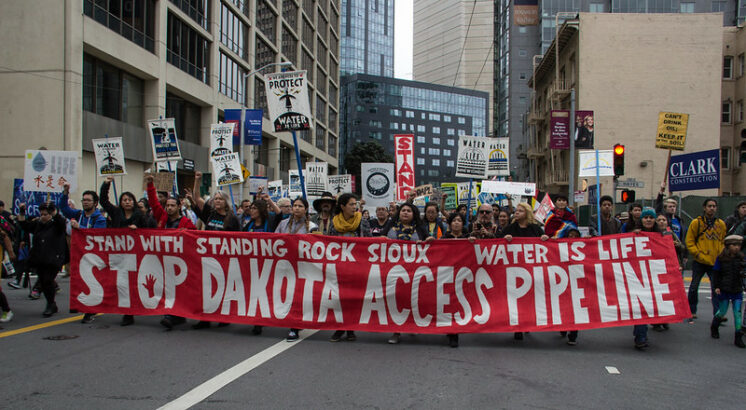Grassroots Indigenous advocacy against the Dakota Access Pipeline (DAPL) has been expanded and amplified by national and international civil society.
 Photo: https://www.flickr.com/photos/43005015@N06/25379630579
Photo: https://www.flickr.com/photos/43005015@N06/25379630579The DAPL is a project of the company Energy Transfer Partner (ETP) to transport crude oil from a field in North Dakota, US to a refinery in Illinois, US. Part of the pipeline is located near the Missouri River, close to the Standing Rock Indian Reservation. Local Indigenous tribes, notably the Standing Rock Sioux tribe, have opposed the DAPL since the project was proposed. They claim that the pipeline threatens Indigenous lands and cultural sites, and their right to clean water, in violation of federal law and existing treaties between the US government and Indigenous American tribes.
Starting in late 2014, the Standing Rock Sioux tribe led grassroots protests against the pipeline. Among other actions, they formed the movement ‘Rezpect Our Water’, which initiated a social media campaign to stop the construction of the DAPL. Other Indigenous organisations established temporary water protectors’ camps near pipeline construction sites, demonstrating against the project and the pipeline’s potential human rights and environmental harms. Tribes and Indigenous organisations across the US, including ‘One Mind Youth Movement’, led by leaders from the Cheyenne River Sioux Tribe, also supported the protests.
The demonstrations gained national and intentional media attention following the increasingly militarised response by US law enforcement to the protests. North Dakota’s governor called in the national guard, and police used tanks, riot gear, pepper spray, teargas, rubber bullets, and tasers against the protestors. National groups got involved to support the protestors. In 2016, Amnesty International USA called on the US Department of Justice to investigate police practices and sent a delegation of observers to protest areas.
International NGOs also helped to bring attention to global financiers of the DAPL. In November 2016, more than 500 civil society organisations from more than 50 countries issued a joint public letter calling on the 17 banks providing a US$2.5 billion loan supporting the DAPL to halt further disbursements of the loan and require the cessation of construction of the pipeline. Several banks subsequently stepped away from their financing of the DAPL or its financial supporters.
ETP’s harmful strategy of ‘SLAPPing’ civil society supporting the anti-DAPL protests ETP’s response to civil society support for the DAPL protests is an example of the harmful corporate strategy of filing strategic lawsuits against public participation (SLAPPs). In August 2017, ETP sued two NGOs, BankTrack and Greenpeace, and advocacy movement EarthFirst!, under US racketeering law. ETP made numerous allegations, including that BankTrack, Greenpeace, and EarthFirst! had manufactured and disseminated false and misleading information about ETP and the DAPL to fraudulently induce donations to their causes, interfered with the construction of the DAPL, and damaged ETP’s business and financial relationships. ETP also alleged that the organisations had incited, funded, and facilitated crimes and acts of terrorism to further these objectives. The SLAPPs against BankTrack, Greenpeace, and EarthFirst! were subsequently dismissed by the US courts.Lawyers and legal centres have also supported the DAPL protests. In 2016, the Standing Rock Sioux tribe, represented by Earthjustice – a not-for-profit public interest and environmental law organisation – filed a lawsuit to immediately stop construction of the DAPL. While this lawsuit was ultimately unsuccessful, Earthjustice subsequently commenced proceedings on behalf of the tribe to, among other things, shut down access to the DAPL and recommence an environmental impact study of the risks of the DAPL to Indigenous rights and the environment. While the DAPL is currently operational, a full environmental impact study of risks associated with the pipeline is ongoing.
Indigenous-led advocacy against the operation of the pipeline continues to this day. This grassroots advocacy been and continues to be supported and amplified by a combination of local, national, and international civil society support against the DAPL.
